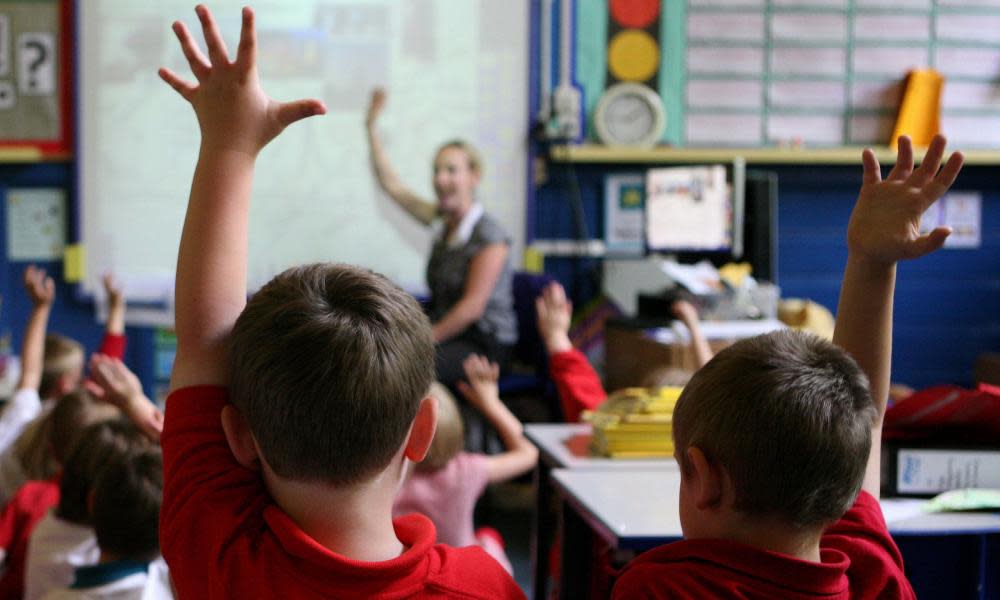When schools can’t afford toilet rolls let alone teachers, we must fight | Julie Ferry

On Saturday I attended my first protest march. The weather was grey and drizzly, my banner, saying “No more cuts” was hastily made the night before and I really wished I had brought a whistle. But along with many other march virgins, I joined a crowd of about 6,000 people walking through Bristol, shouting “No ifs, no buts, no education cuts” at the top of my voice, in protest at cuts to the education budget.
The tipping point for me came when I read an article in our local newspaper about how the cuts would affect each and every school in Bristol. The figures were startling. I discovered that funding would be down by 9% at my children’s infant school by 2019, and over at the junior school they would have to contend with over £200,000 worth of cuts: equivalent to about six teachers.
That put the issue in context. Six teachers could be made redundant just to balance the books. Other equally unpalatable alternatives are reducing school opening hours, increasing class sizes, cutting support for pupils with special educational needs or providing a narrower curriculum. All make it even harder to provide the excellent education that parents and the government demand of schools.
Some state schools are asking parents for financial help. A survey by the charity PTA UK in January this year found a third of parents have been asked to donate money to their child’s school; and in March Marc Lewis, an academy finance manager in north London, told the Times Educational Supplement that some schools are asking for up to £600 a year from parents to cover textbooks and other costs. One primary school in East Sussex even asked parents to donate essential items including glue, pencils, sticky tape and toilet rolls.
My local secondary, one of the best and most oversubscribed in Bristol, has sent letters to parents asking for monthly voluntary direct debit donations of £10 to mitigate critical levels of funding – with a lukewarm response from parents. While I understand the plea, it’s not the answer. Parents need to come together and voice our concerns – reach for a placard, instead of our wallets. My fear is that if parents keep on propping up the system in this way, the full scale of the cuts will not be exposed and challenged.
And what about those schools in areas of economic deprivation where parents simply wouldn’t be able to afford to contribute? Do those schools get left behind? So we need to organise by writing to MPs, raising awareness at the school gates, and attending local meetings and protests – such as the national day of action organised by the Fair Funding for All Schools campaign on 26 May. We need to mobilise to ensure the future of the next generation is a key issue in this election.
The government’s plan to change the school funding formula, which allocates government money to local authorities, is at the root of the debate. The idea is to put an end to a postcode lottery, whereby urban areas like London are well resourced, while other areas receive much less. There are fears most schools will lose out in this redistribution. And add to these changes the implications of rising costs for schools, such as higher contributions to teacher pensions and national insurance, and you have the perfect storm – an educational system that is heading towards a full-blown funding crisis. The government maintains that funding is the highest it has ever been. However, when the National Audit Office looked at the figures they noted that once inflation is taken into account, schools would have to manage an 8% cut in funding per pupil by 2019-20 in real terms.
While we continue to drown in Brexit-related headlines, education is being forgotten; and it is only through parent power, of whatever political persuasion, that the issue will be pushed up the agenda. Already, pressure from voters on the doorstep has ensured Tory MPs have urged the party to rethink its plans. In the Conservative election manifesto £4bn in additional funding for schools was announced, but it was unclear whether this would go towards the core budget for existing schools.
A recent report from the public accounts committee raised serious concerns about how schools would be able to implement cuts: “The actions schools take are likely to increase teachers’ workload, with implications for recruitment and retention, and put at risk the quality of education,” it said, adding: “We may not know the full impact on educational outcomes until 2021 when the new GCSE results come through. This will be too late for the children who are in school now.”
I’m not prepared to wait and see what happens any more, while the number of teaching assistants slowly dwindles and subjects like music and art disappear from the curriculum. My time of sitting on the sidelines is over, and I know many parents feel the same. I’ll be doing as much as possible to galvanise support – and for those that are unconvinced, take a look at the figures for your own children’s schools. I’m pretty sure they will shock you into action too.

 Yahoo News
Yahoo News 
